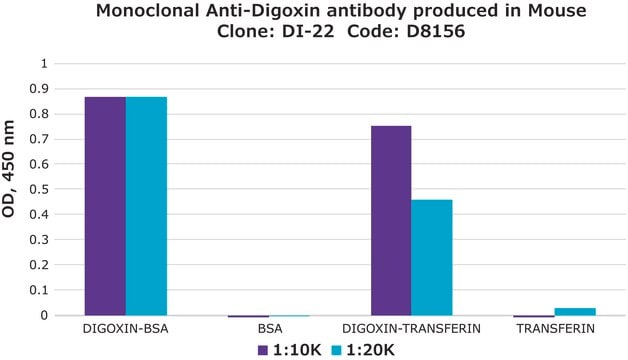D9026
Digoxigenin
analytical standard
Synonym(s):
3β,12β,14β,21-Tetrahydroxy-20(22)-norcholenic acid lactone, 3β,12β,14-Trihydroxy-5β,20(22)-cardenolide, 5β,20(22)-Cardenolide-3β,12β,14-triol, Lanadigigenin
About This Item
Recommended Products
grade
analytical standard
Quality Level
Agency
EPA 1694
Assay
≥98% (HPLC)
technique(s)
HPLC: suitable
gas chromatography (GC): suitable
mp
222 °C (lit.)
application(s)
environmental
food and beverages
forensics and toxicology
veterinary
format
neat
functional group
ketone
storage temp.
room temp
SMILES string
C[C@]12CC[C@H](O)C[C@H]1CC[C@@H]3[C@@H]2C[C@@H](O)[C@]4(C)[C@H](CC[C@]34O)C5=CC(=O)OC5
InChI
1S/C23H34O5/c1-21-7-5-15(24)10-14(21)3-4-17-18(21)11-19(25)22(2)16(6-8-23(17,22)27)13-9-20(26)28-12-13/h9,14-19,24-25,27H,3-8,10-12H2,1-2H3/t14-,15+,16-,17-,18+,19-,21+,22+,23+/m1/s1
InChI key
SHIBSTMRCDJXLN-KCZCNTNESA-N
Looking for similar products? Visit Product Comparison Guide
General description
Application
Signal Word
Danger
Hazard Statements
Precautionary Statements
Hazard Classifications
Acute Tox. 1 Inhalation - Acute Tox. 1 Oral - Acute Tox. 2 Dermal
Storage Class Code
6.1A - Combustible acute toxic Cat. 1 and 2 / very toxic hazardous materials
WGK
WGK 3
Choose from one of the most recent versions:
Certificates of Analysis (COA)
Don't see the Right Version?
If you require a particular version, you can look up a specific certificate by the Lot or Batch number.
Already Own This Product?
Find documentation for the products that you have recently purchased in the Document Library.
Customers Also Viewed
Our team of scientists has experience in all areas of research including Life Science, Material Science, Chemical Synthesis, Chromatography, Analytical and many others.
Contact Technical Service









